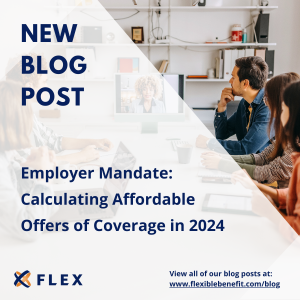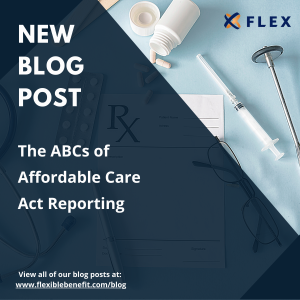Affordable Care Act
The Employer Mandate guidelines state that coverage is affordable when an employee must pay no more than 9.5% of their household income (inflation-adjusted to 8.39% for the 2024 plan year) for self-only coverage which is offered, but which employers know the household income of an employee?
Applicable Large Employers (ALEs) are those who employed 50 or more full-time equivalent employees in the previous calendar year. Under the Affordable Care Act (ACA) law, ALEs must offer minimum essential coverage to at least 95% of its full-time employees or they risk penalties. ALEs who fail to meet this offer requirement risk a significant penalty if just one full-time employee receives a subsidized individual health insurance plan through a Marketplace.
Reporting requirements from the Affordable Care Act (ACA) are rapidly approaching. Health Insurance Marketplaces, health insurance carriers, and employers may be subject to the reporting. The reporting is due February 28, 2023 if filing manually and by March 31, 2023 if filing electronically. Electronic filing is required for entities that are filing 250 or more forms.
Let’s get to the ABCs of the reporting.
The Department of Treasury published a final regulation on October 13, 2022 which eliminates the so-called “family glitch” starting on January 1, 2023.
Lifestyle Spending Accounts (LSAs) have become one of the hottest new employee benefit programs. LSAs are sometimes referred to by other names, such as Personal Spending Accounts or some even refer to them simply as Wellness Programs. There could be a slew of other names, but we refer to them as LSAs.
Grandmothered plans are the name commonly used for health insurance plans in the individual and small group markets that were issued after the Affordable Care Act (ACA) was signed into law (March 23, 2010) and before the so-called full implementation date of the law (January 1, 2014).
Many types of telemedicine coverage eliminate the ability for a person enrolled in a qualified high deductible health plan (HDHP) to make contributions to a Health Savings Account (HSA).
President Jospeh Biden has issued an executive order instructing the Department of Treasury (DOT) to review regulations that pertain to subsidy eligibility on the Health Insurance Marketplace (Marketplace). The primary purpose of the executive order is to determine if regulatory changes can be made to fix the so-called “family glitch.”
On June 28, 2021, the Department of Health and Human Services (HHS) proposed new rules that would primarily impact individual health plans that are sold through Health Insurance Marketplaces. The proposed rules aim to lengthen the annual enrollment period, expand Navigator duties, and minimize any burden or confusion for consumers. A summary of some of the key provisions has been outlined below:
Earlier this morning, the U.S. Supreme Court dismissed a case challenging the constitutionality of the Affordable Care Act (ACA), often referred to as Obamacare. The entire ACA continues to remain as the law of the land.









